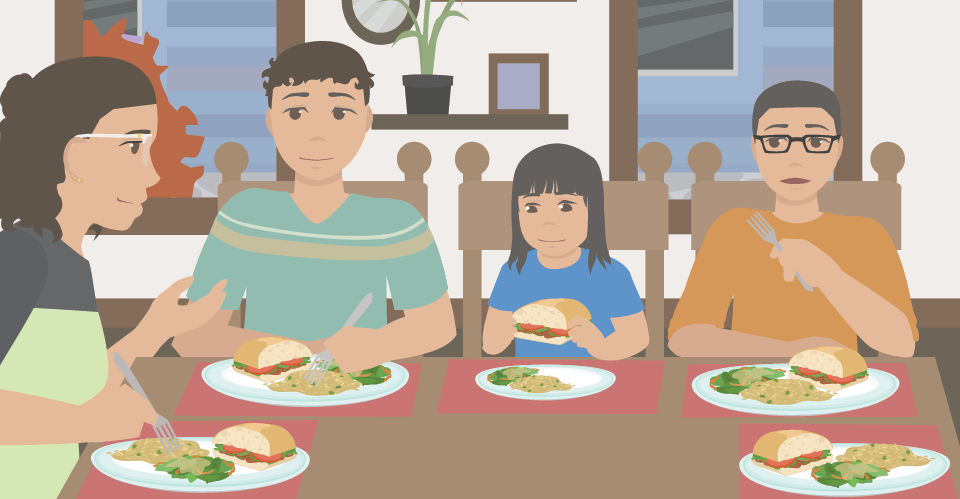How often do you sit down and eat a meal together with your family? October is National Eat Better, Eat Together Month, which encourages families to eat together more often! Life as we know it has been getting busier and busier, and families tend to find it difficult to find the time to sit down and have a simple meal together. Skipping family meals can not only impact your child’s nutritional needs but their emotional and relational needs as well.
Sharing meals has been shown to have many beneficial impacts on both children’s and parents’ well-being, by promoting healthier eating habits and creating more familial stability. The Academy of Nutrition and Dieticians have stated that children who are a part of a family that has regular meals together:1
- Are more likely to have balanced, nutritious meals
- Are less likely to suffer from obesity and other related health issues
- Are less likely to suffer from behavior problems or substance abuse issues
- Are less likely to suffer from isolation and depression
How exactly does eating together impact your physical health? For starters, homemade meals tend to be more nutritious and less processed, overall providing a more balanced meal for your family. Also, people tend to eat slower when sitting and talking to their family, which can allow for slower digestion and prevent overeating, since there is more time to recognize fullness.1 This can help reduce the chances of developing obesity, diabetes, heart disease, and other issues in the future.1 Kids who eat with their families are also exposed to a more wide variety of foods, which helps reduce their pickiness.1 This can also help ensure that your child is getting all of their necessary nutrients, as they will be eating more than just mac and cheese and chicken nuggets!
Shared meals can also be used to help build your family’s relationship, as well as your mental health. This set-aside time allows you to sit down with your kids and have a conversation; catch up with them, as them what’s going on in their lives, and see if they have any potential issues going on.1 This can help build a closer bond between you and your child that may not have been there before. Children and teens who have regular meals with their families are seen as having lower rates of depression, anxiety, and isolation, It has also been shown that kids and teens who share meals with their families are more likely to do well in school and are less likely to engage in behaviors such as drinking and substance abuse.1 Teens who have 5-7 dinners with their families per week are twice as likely to report receiving mostly A’s and B’s in school.3
As we all know, finding this time in our busy schedules can be difficult. If you can’t do a family dinner every day, set a few days a week that you can all eat together. If family dinners are too difficult to coordinate, maybe try family lunches, or even breakfast. Also, try to include everyone in getting the meal ready, like cooking, cleaning, and setting the table. This can make meal preparation easier, and more fun!
For more tips on eating together, meal prepping, and some fun recipes, visit: https://eatwheat.org/learn/eat-better-eat-together/
References
- The benefits of eating meals as a family. Action for Healthy Kids. (2019, September 16). https://www.actionforhealthykids.org/the-benefits-of-eating-meals-as-a-family/
- Eat better, eat together. making mealtime family time: Eatwheat. Eat Wheat. (2019, March 25). https://eatwheat.org/learn/eat-better-eat-together/
3. Mann, M. (2019, September 9). 9 scientifically proven reasons to eat dinner as a family. Goodnet. https://www.goodnet.org/articles/9-scientifically-proven-reasons-to-eat-dinner-as-family



